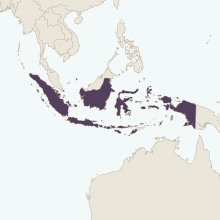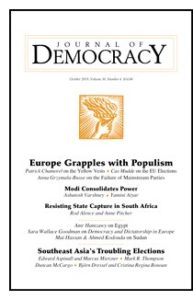
NDI
Since the fall of the Indonesian dictator Suharto in 1998, civil society has flourished under the country’s burgeoning democracy. Observers even began calling Indonesia the most democratic nation in Southeast Asia, notes Jakarta-based analyst Kate Watson. Yet at the same time, movements have been fragmented and divided into thematic silos that make it hard to get across a coherent message, she writes for Foreign Policy:
Women’s rights activists tend to work solely on women’s issues, for example, and environmentalists on agrarian reform and climate change, with little crossover and cooperation. But September saw a change, with tens of thousands of students, activists, and other citizens across the archipelago coming together to protest draconian new civil laws that also weaken anti-corruption efforts. Now, a broad coalition has emerged—at exactly the time that Indonesian democracy has come most under threat in 20 years.
 Are authoritarian and illiberal forces strengthening their hold in Southeast Asia? The latest issue of the National Endowment for Democracy’s Journal of Democracy considers the question in a cluster of articles on recent elections in the region:
Are authoritarian and illiberal forces strengthening their hold in Southeast Asia? The latest issue of the National Endowment for Democracy’s Journal of Democracy considers the question in a cluster of articles on recent elections in the region:
- Edward Aspinall and Marcus Mietzner consider whether national elections in Indonesia marked a parting of ways between pluralism and broader democratic norms;
- Duncan McCargo explores the flawed electoral process that yielded victory for supporters of Thailand’s ruling junta;
- Björn Dressel and Cristina Regina Bonoan examine the troubling implications of President Rodrigo Duterte’s gains in the Philippines’ midterm elections; and
- Mark R. Thompson offers an overall assessment of developments in the region.
Through 15 November 2019, visit Project MUSE to access free of charge articles covering South Africa’s struggle against state capture; recent elections in South and Southeast Asia; the roots of European populism; the aftermath of Sudan’s 2018–19 uprising; and more in the Journal of Democracy’s recently released October issue.







